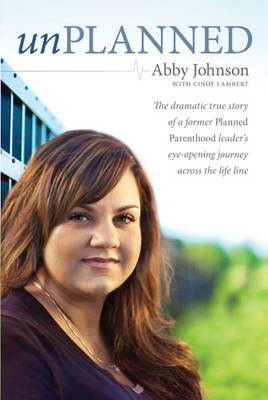Abby Johnson’s pro-life conversion
On Friday last week, fresh from the studios of Women’s Hour, Abby Johnson spoke to the Catholic Voices Academy in London about “Changing Minds on Abortion”. Abby is a former executive at Planned Parenthood in Texas who quit the organisation suddenly in October 2009, a decision precipitated by the emergence of several convictions within her, some heart-felt, others more prosaic.
Abby explained how she “slid” into working for Planned Parenthood believing, perhaps naively, that its central aim as an organisation was to reduce the number of abortions taking place each year. Such a reduction would be as a consequence of improved access to contraception and ‘safe sex’ education.
Slowly, she realised that in fact PP is a business like any other. The abortion industry is captured by producer interests with financial incentives skewed towards supplying services. Income is calculated on ‘sales’ made, and as more revenue is generated via terminations than the supply of contraceptives or sex education programming, the business has to carry out a set number of terminations in order not only to pay basic fixed costs like property rental and staff employment but to make a surplus for investment and marketing too (such costs were particularly onerous in the facility Abby worked at, which boasted of being the largest in the world outside of China).
The economic impetus translated into targets for abortions, and progress up the PP management hierarchy is performance related in part on achieving and surpassing these goals. This dynamic is the exact opposite of the one Abby anticipated, and her enthusiasm soured when her boss told her to double her clinic’s annual quota because “that’s how we make our money”.
Abby also spoke of her evolving views on foetal viability outside the womb and the unborn baby’s capacity for pain. A quick glance at People magazine one day alerted her to the improving medical care for premature babies which has incrementally lowered the gestational age when infants can be born alive and has substantially improved their chances of living full lives. These advances crushed in Abby’s mind one of the key arguments for abortion based on time limits, which sees as permissible anything not prescribed by law. If the time limits are contingent on medical science, and that science is ever improving, time limits (and thus related justifications for abortion) are effectively arbitrary lines in the sand.
A similar chance event in one particular abortion shaped Abby’s view on foetal pain, as she witnessed the ultrasound-guided termination of a 13-week old boy and perceived him to be “fleeing” the deadly needle. Abby described “feelings of sadness, betrayal, that I had been lied to” as she lived through the cognitive dissonance of her previous beliefs and the evidence of the new data before her. One day in 2009, enough was enough: without pro-life friends, she drove (to avoid being noticed) the short distance to the nearby offices of a pro-life group, and was immediately accepted into the fold (and, incidentally, afterwards became a Catholic). Her book, Unplanned, is an expose of the abortion industry, and she now campaigns against abortion in the US and overseas, focusing in particular on assisting abortion workers who wish to leave.
Put aside any objections you have to Abby’s reasoning, because none of the arguments for becoming pro-life are fool-proof ‘smoking guns’: if they were, everyone would see sense on abortion. Instead, notice how each factor bears down on her conscience and accumulates, crystallising in her final revulsion. They were individual evolutions in her thinking that, when combined, caused a revolutionary response. Of course, other contextual factors were at play too: her husband was pro-life (but not so much that he didn’t stop her working for PP in the first place…), she had had two previous abortions and (although she did not dwell to heavily on this in her talk) I imagine there was a degree of regret (happily, she is now mother of three children and expecting a fourth). But Abby is a classic example of a successful set of ‘nudges’ that radically reoriented her thinking and behaviour, and the pro-life movement should be more open to this.
The pro-life movement is already comprised in part of practical methods for nudging women away from the option of an abortion. Crisis pregnancy centres and organisations like LIFE provide counselling and material assistance. Medical professionals have their conscientious objections protected in law (Abby pointed out the irony that pro-abortion supporters were labelled pro-choice), and no doubt there will soon be a dedicated organisation reaching out to abortion workers to encourage them away from Marie Stopes and BPAS and to aid those who seek to leave. In the US and elsewhere there is an annual March for Life, and it is hoped the UK will have a similar anniversary demonstration in the near future, building on the public witness of the 40 Days for Life campaign.
The pro-life movement rightly seeks to create a civil rights movement to stand in the annals of history alongside other great awakenings: the anti-apartheid campaign that propelled Nelson Mandela to international fame, the marches and protests that led to the US Voting Rights Act, or the abolishment of slavery in the British Empire. Other popular movements exist today, as Abby and Shawn noted, albeit on smaller scales: witness the environmental campaigning, where people are told they have ‘saved the world’ by sorting their recycling, or the activities of supporters of same-sex marriage. Abby Johnson’s testimony should remind us all of the task at hand.
Tags: Abby Johnson, abortion, pro-choice, pro-life, Unplanned

















